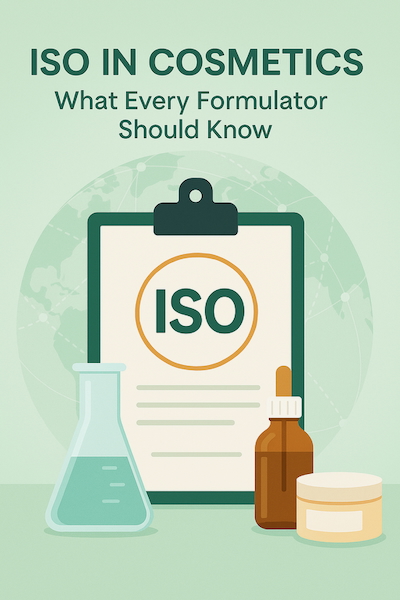What is ISO?
If you’ve ever researched international standards, product certifications, or quality management systems, you’ve probably seen the acronym ISO. But what does it actually mean, and why is it important in so many industries, ISO for cosmetics and skincare to technology, manufacturing, and food production?
What Does ISO Stand For?
ISO stands for the International Organization for Standardization. It’s an independent, non-governmental international organization that develops and publishes standards, agreed-upon ways of doing things, that are recognized around the globe.
The name “ISO” isn’t an abbreviation for the organization’s full title in English or French. Instead, it comes from the Greek word isos, meaning “equal.” The idea is simple: no matter where you are in the world, ISO standards create a common language and consistent quality expectations.
What is a Standard?
An ISO standard is a documented agreement that provides guidelines, specifications, or criteria to ensure that products, services, and systems are safe, reliable, and of high quality. Standards can cover everything from product dimensions and testing methods to environmental management practices and social responsibility guidelines.
For example:
-
ISO 9001: Quality management systems
-
ISO 14001: Environmental management systems
-
ISO 22716: Good Manufacturing Practices (GMP) for cosmetics
-
ISO 16128: Guidelines on natural and organic cosmetic ingredients
Why ISO Matters
ISO standards help ensure:
-
Consistency – Customers receive the same quality every time.
-
Safety – Products meet established safety benchmarks.
-
Efficiency – Businesses reduce waste, improve processes, and save costs.
-
Global compatibility – Standards make it easier for companies to trade internationally.
Why Cosmetic Formulators Need to Know About ISO
For cosmetic formulators and manufacturers, whether you’re creating products for your own brand, manufacturing for clients, or developing formulas for a larger company, ISO standards for cosmetics provide the framework for safety, quality, and compliance.
Here’s why it’s essential:
-
Compliance with regulations – Many countries require cosmetic manufacturers to follow ISO 22716 (GMP) or equivalent practices to legally sell products.
-
Product safety and stability – ISO guidelines help ensure formulas are made under controlled, hygienic, and documented conditions, reducing the risk of contamination or instability.
-
Market access – ISO compliance builds credibility and can open doors to international markets that demand proof of standardized processes.
-
Brand trust – Consumers and retailers are more confident in products that meet recognized quality standards.
-
Professional credibility – Knowledge of ISO requirements shows that you are a serious, skilled formulator who understands the industry’s professional and safety expectations.
How ISO Develops Standards
ISO standards are created through a consensus process involving experts from around the world. These experts represent different sectors, industry, government, academia, and consumer groups, ensuring a balanced and practical approach.
The process generally follows these steps:
-
Proposal – A need for a standard is identified.
-
Development – Technical committees draft the standard.
-
Public review – Stakeholders can provide feedback.
-
Approval – Member bodies vote on the final draft.
-
Publication – ISO publishes the official standard.
-
Review and update – Standards are periodically revised to stay current.
Download Quick Notes from this blog post
ISO Certification
While ISO develops standards, it does not certify companies. Certification is performed by external organizations known as certification bodies.
For example, a manufacturer can be certified to ISO 22716 by passing an audit from an accredited certification body. This certification demonstrates to customers and partners that the company meets the requirements of the standard.
The Bottom Line
ISO exists to make our world safer, more efficient, and more consistent. Whether you’re buying electronics, medical devices, food, or cosmetics, there’s a good chance ISO standards are working behind the scenes to protect you and ensure quality.
For cosmetic professionals, understanding ISO standards, especially those related to Good Manufacturing Practices and Guidelines on Natural and Organic Cosmetic Ingredients, can be a key step toward building trust, meeting regulations, and successfully selling products in global markets.
Take one of our Courses in Professional Cosmetic Formulation and Become a Cosmetic Formulator
You might also like


